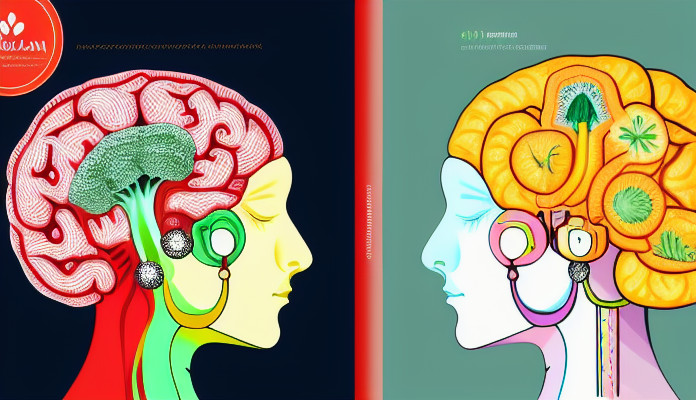Our physical being is profoundly interwoven with the spiritual. Food, in essence, is not merely sustenance for the body; it is the divine catalyst for the ongoing dance of life – a mystical play of creation and dissolution that feeds both our corporeal and ethereal selves.
The journey begins with the act of eating, wherein food is transformed into the most basic building blocks of life: nutrients. These nutrients then have an intrinsic role in the production of hormones, which could be understood as the body’s messengers, liaising between different cells and organs to maintain the harmony of our biological orchestra.
Our bodies ingeniously convert food into hormones such as insulin, leptin, and ghrelin, regulating our metabolism, hunger, and satiety. Simultaneously, food also influences our neurochemical symphony – it impacts the creation of neurotransmitters like serotonin and dopamine, affecting our mood, sleep, and overall wellbeing. Here, we can perceive food as the scriptwriter of our biological narrative, the unseen hand guiding the tale of our bodily experience.
With the rise in hormonal activity, there is a corresponding surge in energy. This energy, prana or chi, is the vital life force that animates our physical bodies and fuels our spiritual journey. This energy is not merely the fuel for physical activity but also the light that illuminates our inner landscape. It empowers our cognitive functions, our emotional experiences, and, importantly, our capacity for introspection and insight.
The rise in energy births a plethora of thoughts. Thoughts are like waves that arise from the ocean of consciousness, and their intensity and frequency are directly proportional to our underlying energetic state. With this understanding, we realize that the act of eating does not solely influence our physical wellbeing, but also shapes the contours of our thought and spiritual journey. Our diet does not just create our body but also our mental and emotional landscapes. It is not an understatement to say that our food choices determine the reality we experience and inhabit.
However, it is essential to note that while the interplay of food, hormones, energy, and thoughts is complex and profoundly influential, it is not the only determinant of our mental and spiritual state. Our thoughts and emotions also spring from the realm of the spirit, from the depths of the soul.
The connection between the body and mind is a powerful one. How we nourish our bodies directly impacts our mental, emotional, and spiritual wellbeing. This connection, while potent, is often overlooked or undervalued. To truly grasp the profound influence of our dietary choices, one must engage in an exploratory journey of personal discovery.
I invite you on a conscious experiment with your food choices. Embrace curiosity and mindfulness as you explore different diets and observe how they affect your hormonal balance, energy levels, desires, and thoughts. Remember that this is not a test with a right or wrong answer, but a journey of understanding your unique body-mind connection.
Take notice of how consuming a high-protein diet influences your energy levels compared to a predominantly plant-based diet. Consider the feelings of satiety, clarity, agitation, or lethargy that follow a meal. You may discover that certain foods leave you feeling anxious and agitated, while others bring about a sense of calm and centeredness.
Take, for example, the case of estrogen. Some foods are known to contain phytoestrogens, plant-derived compounds that can behave like the hormone estrogen in the body. Foods such as soy products, flax seeds, and certain fruits and vegetables can have an impact on your hormonal balance. This change in hormonal balance may lead to subtle shifts in your emotional state, desires, and thought patterns.
Also, observe how the energy derived from food influences your desires. Foods high in simple sugars may offer a quick energy spike, leading to heightened activity and potentially a surge in desires. If these desires remain unfulfilled, the unused energy may morph into frustration or anger. Recognizing this process can help you manage your emotional state more effectively by adjusting your diet accordingly.
The balance between the foods we consume and our mental state is delicate. High energy foods may propel us towards action, and if that energy is not directed towards fulfilling activity, it may lead to restlessness, desire, and ultimately frustration or anger. Conversely, a diet lacking energy may leave us feeling lethargic, depressed, and disinterested in life’s joys.
Mindful eating is a beautiful practice that enables us to listen to our bodies and learn from them. It teaches us that food is not just fuel but a tool for enhancing our spiritual, emotional, and mental wellbeing. As we become more attuned to the effects of different foods on our hormones, energy, and thoughts, we can make choices that not only nourish our bodies but also nurture our inner selves.
Your dietary journey is a personal one, unique as a fingerprint. While guidelines and research can guide us, the ultimate wisdom lies within you. Embark on this journey with an open mind and heart, bearing in mind that the goal is not perfection but increased awareness and understanding. As you delve deeper, you’ll discover that your plate does not just hold food; it holds the key to understanding your body, mind, and ultimately, your Self.
We are not just what we eat, but also how we eat, why we eat, and ultimately, our consciousness that observes, experiences, and transcends the act of eating. Through this awareness, we can realize that each bite we take is an opportunity to nourish not just the body, but the entirety of our being. Each meal is a prayer, an affirmation of life, a commitment to nurturing the divine within us. And with each act of conscious eating, we step closer to understanding and embodying the interdependence of our spiritual and physical selves.





